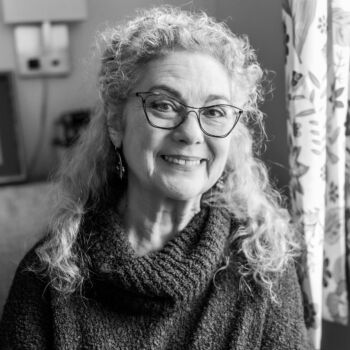November 27, 2023 Community Stories
Behind the Curtain: A Play’s Evolution Continues
In the arts realm where creativity and storytelling have no bounds, we illuminate recently announced ValleyCreates Project Evolution 2023 Grantee Carmela Lanza-Weil, a playwright, producer/director, and educator.

During the first 18 months of the COVID pandemic, Lanza-Weil managed the Franklin and Berkshire unit’s Medical Reserve Corps volunteer response activities, which tripled in size after March 2020. Her project, The Covid Show (a working title), took root during the pandemics dire days when she recognized the collective lack of preparedness to respond effectively to the pandemic. The play explores the human condition and provides audiences with a glimpse into the challenging and chaotic response from a rural public health perspective.
Project Evolution grants are meant to advance the work of artist projects and pair project support with cohort learning, one-on-one coaching, and additional project-administration-oriented professional development to ensure that artists have the tools they need for their project to succeed.
Recently, we asked Lanza-Weil to share a bit about her artistic journey and her work in progress.
Q: Tell us a bit about yourself, what you do, and the spaces in which you do them.
I am a theater creator, producer/director, and educator. I work with other artists, technicians, and academics to create new work that reflects and responds to human experiences. This focus came after years of acting and directing in traditional theater and opera organizations and educational settings. When my parents died, I was surprised by the response of people I knew — some close friends disappeared, while some bare acquaintances rallied around.
I realized that dealing with death and grief is learned through experience. What if theater could help provide insight to people so they can know what to say, not to say, how to respond? That question started my focus on creating theatrical explorations into things people don’t want to think about – death, grief, aging, caregiving, and forgiveness.
My theater creation process often begins with conversations and interviews with people who have lived experience with the theme I’m exploring. I invite them to tell their stories and then, working with playwrights or on my own, I create theater pieces designed to present those stories, including my own, in an accessible, entertaining, and thoughtful production. Post-performance talk backs are an important part of the experience and offer the opportunity for the audience to join with each other and the artists to further explore what they learned, what they felt, and what they take home.
Most times, I produce plays in theaters, but I have also presented my work in community settings, fundraising events, medical schools, and once, in an abandoned mill building’s parking lot. For this show, I’m still mulling through where it should land.
Q: Has playwrighting always been an ambition of yours?
I fell in love with theater at a young age, producing my original plays with a neighborhood cast. In middle school, I was cast in my first play, and I was bit by the theater bug—a virus from which I have not recovered. I embraced the title “artist” when I began directing and felt the full responsibility and joy of leading the creation process that resulted in something wonderful. Despite the struggles, disagreements, stress of fundraising and bad reviews, most often the pleasure of working in, with, and around theater people far outweighs the burden.
Q: Which humans in the art world have inspired and influenced your journey?
Of the many people who influenced and inspired me, I would list my first director, David Bennet, back in middle school in Colorado Springs, CO; Dmae Roberts of MediaRites (Portland, OR) who became a great collaborator on many projects and trusted me with directing her plays; the late Michael Griggs (also from my Portland years) who exposed me to international theater artists through his International Performing Arts Festival; and Rinde Eckert, Lee Breuer, Theodora Skipitares, and the faculty at Towson University’s graduate program for self-producing artists, where I earned my MFA.
Q: What’s your vision for the play and the impact you hope this project will have?
My project continues to evolve. At this moment, I envision an experience that invites the audience to reflect on their experience during the pandemic through first-person stories and published research. Through that examination, my hope is we will begin to realize the impact of the pandemic and the lasting effects. Too many times I’ve heard people talk about ‘getting back to normal’ which, to my mind, doesn’t exist. We experienced a life-changing event that will continue to inform life going forward. The questions I want to explore and illuminate for my audience include: What actually did happen? What did we learn? How has the pandemic changed us? How can we prepare ourselves, our communities, and our public health system to respond better next time, armed with the information we gained during COVID-19?
Q: For those that may not know the impact ValleyCreates has had on our local artist grantees, tell us how you’ve gained professionally from the benefits of our program?
The Community Foundation, through ValleyCreates, provides amazing trainings, opportunities for connections, and – most importantly- artist friendly funding opportunities. So often, complex grant applications require hours of preparation with responses based on hopes and wild guesses that you’re then required to follow, regardless of whether it still makes sense. The limited flexibility of many grant-making organizations stifles creativity rather than encouraging it. Lengthy grant proposals and extensive reporting requirements can make securing limited funding cost more than the grant award, not a sustainable plan.
The funding approach for this grant helped me articulate what I THINK it will look like but also acknowledged it may not end up there—it is so refreshing to get the message that we are PARTNERS in this endeavor and ValleyCreates is there to help and support—which it does!
Learn more about the Community Foundation’s ValleyCreates program and read more about other project evolution grantees.
